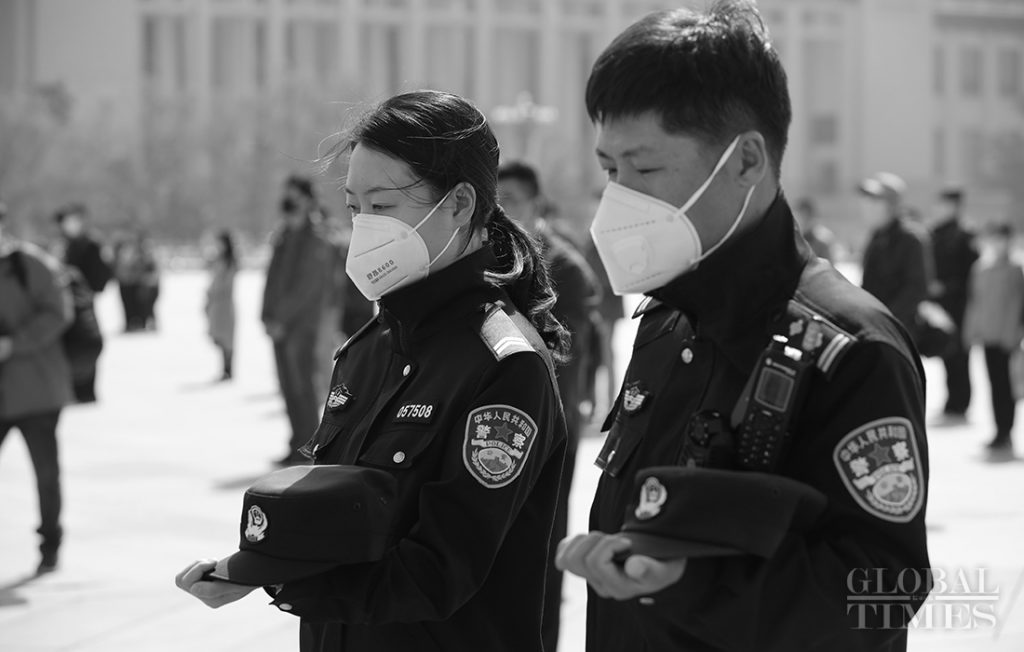A three-minute period of silence was observed nationwide at 10 am. Air raid sirens and the horns of cars, trains and boats were also sounded.
China is holding a national day of mourning on Saturday to commemorate the 3,335 victims so far of the COVID-19 outbreak, including medical workers and police officers who sacrificed their lives during the battle against the epidemic in the country.
Flags fly at half-mast across China and at Chinese embassies around the world on April 4, which is the Qingming Festival, also known as Tomb-Sweeping Day. Public recreational activities are all suspended during the day in China. Chinese major network game service providers Netease and Tencent both suspended services this day.
President Xi Jinping led other Chinese leaders on Saturday to attend national mourning for martyrs who died fighting the novel coronavirus disease (COVID-19) and Chinese compatriots who lost their lives in the outbreak.
They had white flowers pinned to the chest and paid a silent tribute in front of a national flag, flying at half-mast.
A three-minute period of silence was observed nationwide at 10 am. Air raid sirens and the horns of cars, trains and boats were also sounded.
In Wuhan, the hardest-hit city in China during the epidemic, all vehicles on the road stopped moving at 10 am for three minutes, during which all traffic lights were set into red.
Events to mourn the victims are also held around the country.
Many netizens changed their profiles on social media platforms like Sina Weibo to black-and-white or gray pictures to express condolences.
They expressed gratitude to residents in Hubei Province and Wuhan and those who died confronting the epidemic.
China previously held national days of mourning for major natural disasters that claimed thousands of lives. But this year’s event has extra meaning as a national and global event, Yang Zhanqiu, a Wuhan-based virologist, told the Global Times on Saturday.
China, bearing on huge cost, has achieved preliminary success on the battle against COVID-19. Its mourning over the lost lives shows the country’s respect to life and will also inject confidence to the world on the battle against the pandemic, Yang noted.
The steps China has taken to contain the outbreak appear to have bought the world time, even though those steps have come at great cost of China itself, World Health Organization Director-General Tedros Adhanom Ghebreyesus commented on China’s work against the COVID-19 epidemic at a conference on February 15.
Richard Horton, editor-in-chief of the Lancet, suggested the world join China’s national day of mourning and make April 4 a global day of mourning for the victims of the COVID-19 outbreak.
The national day of mourning came as China has effectively brought the epidemic under control in the country, as some other countries are struggling in the tough battle. Chinese experts call for the world to work together and learn from China’s experiences to efficiently curb the virus and avoid the mass sacrifice China has suffered.
According to media reports, more than 8,000 medical workers in Italy have been infected with 63 doctors dead as of March 30. In Spain, the number of infection cases among medical workers was more than 12,000 as of the same day.

China’s current achievements against the epidemic did not come easy. It is the country’s strict and efficient prevention and control measures that avoided more sacrifice, Zeng Guang, chief epidemiologist with the Chinese Center for Disease Control and Prevention, told the Global Times on Saturday.
China feels sympathy to other countries’ loss in the battle. No one can guarantee that a similar event will not occur again, but in this time’s COVID-19 pandemic, the world could work together for a result as good as possible, according to Zeng.
China has experienced more than two months of a tough battle against the epidemic, with more than 3,000 lives lost as of Friday and those who sacrificed during the epidemic prevention and control work.
As of Thursday, a total of 60 frontline police officers and 35 auxiliary police officers had sacrificed their lives at the frontline of the battle, according to the Ministry of Public Security.
At least 46 medical workers have also sacrificed during the battle as of March 15 by risking infection, over-work or accidents.
The epidemic has also affected China’s economy and Chinese people’s mental health. Psychologists also predict an outbreak of mental issues occurring among Wuhan residents, especially among patients and medical workers fighting at frontline.
China held its last national day of mourning at such a grand scale in May 2008 for the victims of the Wenchuan Earthquake in Southwest China’s Sichuan Province, which killed at least 69,000 people.
The country also flew flags at half-mast and suspended national entertainment activities twice in 2010 after an earthquake happened in April in Yushu, Qinghai Province, killing 2,698, and a mudslide in August in Zhouqu county, Northwest China’s Gansu Province, killing 1,248 and destroying more than 5,000 houses.
Source: Global Times



